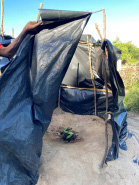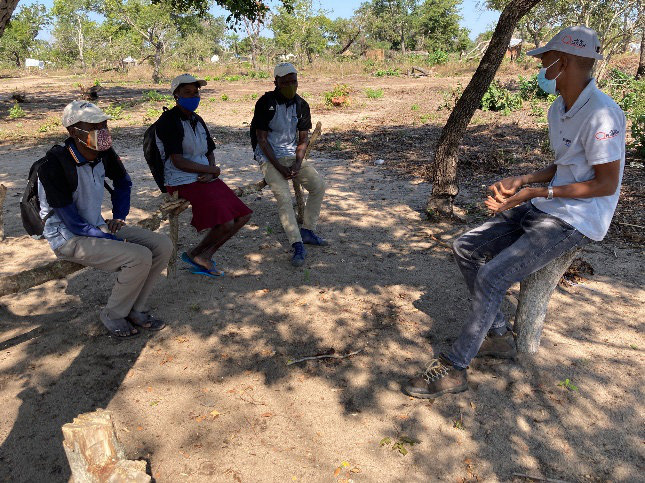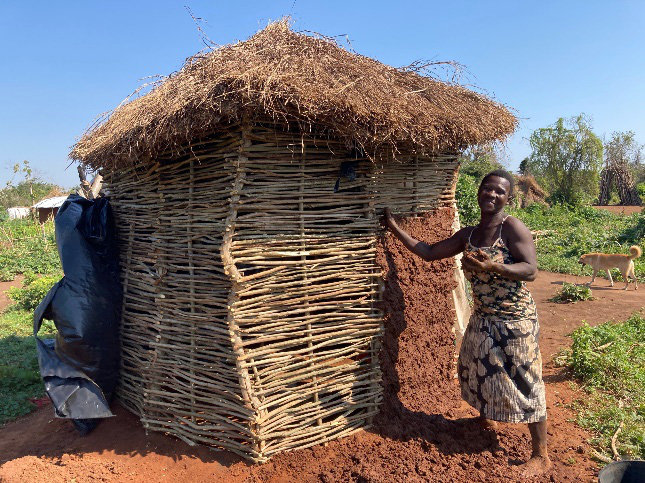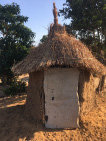By Nao Iwano | PWJRepresentative, Beira Office, Mozambique
Improving Sanitation in Resettlement Areas
Support for cyclone victims in Mozambique
Peace Winds Japan (PWJ) is working in a resettlement area for people in Sofala Province, Mozambique, who were severely impacted by Cyclone Eloise. The government-designated resettlement area was originally bushland and fields, which lacked crucial infrastructure such as water and electricity. PWJ is supporting the construction of wells and other facilities to ensure a sustainable supply of safe water. Additionally, PWJ is conducting hygiene awareness activities toensure a safe and sanitary environment in the resettlement area.
In Mozambique, few households have toilets at home. According to a World Bank survey, 40% of the population relieves themselves in the open. In fact, when you use a bathroom in a rural Mozambique household, you may be led to an unenclosed area behind the house. It is also not uncommon to see people suddenly appear from the undergrowth, having done their business their without a sound. However, such a practice can lead to a serious danger of feces getting mixed with rainwater, which spreads further afield, and with it the risk of widespread infectious diseases, such as cholera.
Activities to promote the use of enclosed toilets have been carried out in many places, and public facilities have been installed by the government and United Nations agencies. However, ratio of lavatories to residents is very low. Furthermore, since there is no electricity in the resettlement areas, it is very dark at night, and it has been observed that women and children are afraid to use such public facilities of and either hold back, or relieve themselves in the open nearby. This makes the installation household toilets an urgent necessity.
PWJ started to promote the construction of latrines and an education program to disseminate hygiene knowledge by appointing support staff called "Activista" from the resettled community to raise sanitation awareness among residents.
Instead of simply distributing toilet construction materials, PWJ promotes the construction of latrines using sustainable materials that are readily available locally, such as tree branches, palm tree leaves, soil, etc. In this way, we have been able to create a system that breaks away from the conventional aid structure of relying on rationing and avoiding self-action. Instead, it fosters an attitude of self-help and using what is available in the immediate environment. In addition, PWJ staff and local residents share their knowledge, establishing ways to build and maintain more durable toilets, andthereby improving independence and self-reliance.
As a result, of the 615 households in one resettlement site, the number with toilets has increased from less than 10 to 517. These facilities are a source of great pride among residents, who eagerly show them to us whenever we visit.
On one visit, many residents came up to me and said, "Look at our toilets!” In fact, when you go there, the first thing you notice is how clean and odor-free the toilets are.
PWJ will continue to work together with Activista staff to ensure that every household has a toilet they can be proud of, and that every resident has the proper hygiene knowledge to contribute to improving the sanitary environment in their community.
By Nao Iwano | Country Representative
By Yuko Ishida | Coordinator
Project reports on GlobalGiving are posted directly to globalgiving.org by Project Leaders as they are completed, generally every 3-4 months. To protect the integrity of these documents, GlobalGiving does not alter them; therefore you may find some language or formatting issues.
If you donate to this project or have donated to this project, you can receive an email when this project posts a report. You can also subscribe for reports without donating.
Support this important cause by creating a personalized fundraising page.
Start a Fundraiser


